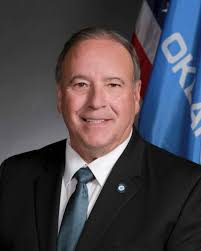Kiger Holds Interim Study on State Park Parking Fees
Mike Seals - August 26, 2020 9:35 am

OKLAHOMA CITY – State Rep. Lundy Kiger, R-Poteau, on Tuesday hosted an interim study on state park parking fees before the House Appropriations and Budget Subcommittee on Natural Resources and Regulatory Services
Kiger said he requested the study after the Oklahoma Tourism and Recreation Department’s started charging parking fees of between $8 to $10 at about half of Oklahoma’s state parks earlier this summer.
“I wanted to give members of the Tourism Department the opportunity to present their case and answer questions as to why they feel these fees are necessary,” Kiger said. “I also wanted to give other lawmakers a chance to publicly voice their concerns and ask questions. This also allowed several people from the public and private sector the ability to share their ideas of raising revenue for our parks without unduly charging locals or those of low income.”
Kiger said after the Tourism Department raised parking fees in June at many of the state parks, he heard from other lawmakers and many constituents who felt the fee structure was unfair to locals and those of low or limited income who have enjoyed the natural resources in their areas for years without paying an extra fee. He said these people are not opposed to charge out-of-state visitors, but they believe they’ve already contributed their share for the parks and their regular maintenance and upkeep by paying local and state taxes.
Jerry Winchester, executive director of the Oklahoma Tourism and Recreation Department, and Deputy Director Gino DeMarco spoke at the meeting explaining that the cost of upkeep and maintenance at the state parks far exceeds the amount appropriated to the parks each year by the Legislature or raised in the forms of usage fees. They said the parking fees are allowing them to maintain roads, bridges and parking lots at the parks as well as put in new restroom facilities, upgrade restaurants, lodges, cabins and other amenities.
They said rather than consider each park individually, they are trying to treat the system as a whole. They conceded, however, that some parks like Alabaster Caverns or Little Sahara in the Northwest portion of the state charge entrance fees instead of parking fees. So there are some exceptions.
Also speaking at the study were State Rep. Johnny Tadlock, R-Idabel; Karen Wages, CEO of the Poteau Chamber of Commerce and director of the Donald W. Reynolds Community Center; and attorney Susan Jenson.
Jenson presented an idea of public-private partnerships that could be utilized to tie in other amenities from areas around state parks. She spoke of the Heavener Rune Stone, which the state closed as a state park several years ago but that was restored to use by a private group as an example of how such a partnership could be successful.
Both Kiger and Tadlock suggested that even though Oklahoma residents already pay less than out-of-state visitors, they should be charged even less or perhaps there is a way to exclude local residents from paying at the parks in their immediate area or a possible exemption for those of low income. The lawmakers argued that many families in their areas have enjoyed their local lakes for years believing that when they approved local sales taxes or paid their state taxes, part of that would go toward upkeep of facilities at the lakes. The extra fee is hard on many of their constituents who have limited income, they said.
Kiger suggested that just as veterans and senior citizens receive a discounted rate or a waived fee, perhaps those who can show proof of low income could also have the parking fee waived.
Kiger and other lawmakers agreed the parks need money to stay operational and enjoy upgraded facilities to attract even more visitors. Kiger said he feels this could be accomplished, however, through means other than charging parking fees from local residents.



